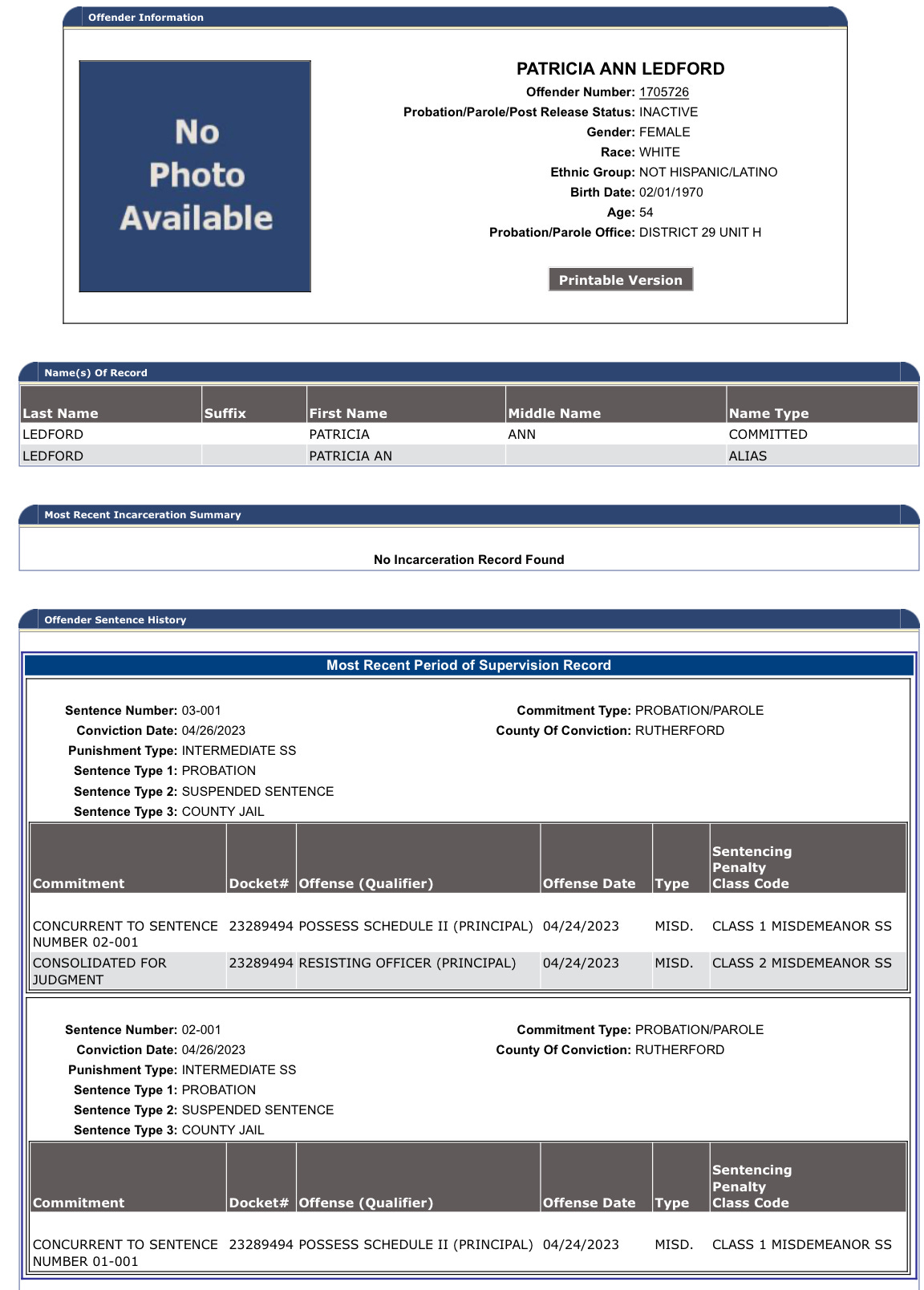Exclusive details: Traffic stop leads to felony charges, Links to ongoing multi-county investigation, police say
Patricia Ledford, 54, was arrested on Sunday, according to public records and a statement from the Rutherford County Sheriff’s Office.
A routine patrol by Rutherford County Sheriff's deputies early Sunday morning resulted in the arrest of Patricia Ledford, 54, following a traffic stop in the Gilkey/Union Mills area, police said.
The deputies, who were monitoring the area for reckless driving, observed an SUV being operated in an unsafe manner and initiated a vehicle stop. Upon investigation, authorities discovered narcotics, including cocaine and methamphetamine, as well as stolen debit and credit cards.
The enforcement efforts appear to be part of the Labor Day Booze It & Lose It campaign through September 8.
The arrest of Ledford, who is now facing multiple felony charges including possession of cocaine, possession of methamphetamine, possession of drug paraphernalia, possession of stolen property, and reckless driving, has been linked to an ongoing investigation involving both Rutherford and Gaston Counties, police said. She was booked into the Rutherford County Detention Center under a $10,000 secured bond set by a magistrate under the state’s bond guidelines.
This is not Ledford's first encounter with the law. State records show that she was charged with multiple misdemeanors last year in Rutherford County. In April 2023, she was convicted of possessing a Schedule II controlled substance and resisting an officer.

The Sheriff's Office continues to investigate the current case, with the possibility of additional charges or arrests as more details emerge.
Cops & Congress commentary: Low bond amounts in North Carolina—What's next?
North Carolina's justice system is under increasing scrutiny as low bond amounts raise concerns about public safety and the efficacy of our courts. The recent case in Rutherford County, where Patricia Ledford was arrested on multiple felony charges including drug possession and reckless driving, only to be released on a $10,000 secured bond, underscores a troubling trend. It's a pattern we've seen before: individuals with serious charges, even those with prior convictions, often walk free while awaiting trial, thanks to what many see as inadequate bond amounts.
Low bond amounts are designed to balance the rights of the accused with public safety. The principle is simple: ensure that a person returns for their court date without imposing an undue financial burden, especially on those who may be innocent. However, when bonds are set too low, particularly for repeat offenders or those facing serious charges, it sends a message that the consequences for criminal behavior are minimal. This not only undermines the deterrent effect of the law but can also put communities at risk.
So, what's next for North Carolina? The debate around bond reform is likely to intensify. Law enforcement agencies and public safety advocates are calling for a more nuanced approach—one that takes into account the severity of the crime, the defendant's criminal history, and the potential danger to the community. The introduction of risk assessment tools that better predict a defendant's likelihood to re-offend or flee could help judges make more informed decisions.
Moreover, legislative action may be on the horizon. Lawmakers could propose changes to bond guidelines, ensuring that individuals charged with serious or violent crimes face higher bonds or even mandatory detention in some cases. There could also be a push for greater accountability in how bond decisions are made, with increased oversight or standardized criteria across counties.
For now, the conversation continues. As communities watch cases like Ledford's unfold, many wonder whether the system is truly working as it should. The balance between justice and safety is delicate, and it's clear that North Carolina has some serious thinking to do about where that balance should lie.
As the debate progresses, one thing is certain: the status quo is increasingly being questioned, and change may be coming. The challenge will be finding solutions that protect the rights of the accused while keeping our communities safe.
Situational awareness: An exclusive, or scoop is an important news story that is first reported by a journalist. This goes beyond breaking news when no other journalists are known to be reporting on an important issue.
This article is free to read due to generous support from founding member subscribers. Thank you. Please support my future work. (ICYMI: Six reasons to support my independent journalism)
🏛️ All those mentioned are presumed innocent until proven guilty.
Learn more about this newsletter and my background. I am guided by the Society for Professional Journalists Code of Ethics. Follow me on X (Twitter), Facebook, Linkedin, Instagram, TikTok, and YouTube. Send constructive criticism, fan mail and tips with public documents for future stories: CopsandCongress@gmail.com.
Interested in sponsoring a future issue of Cops & Congress? Email me with your ideas and budget.
(Free subscribers: Upgrade to paid to leave a comment below and don’t miss out on exclusive content.)



